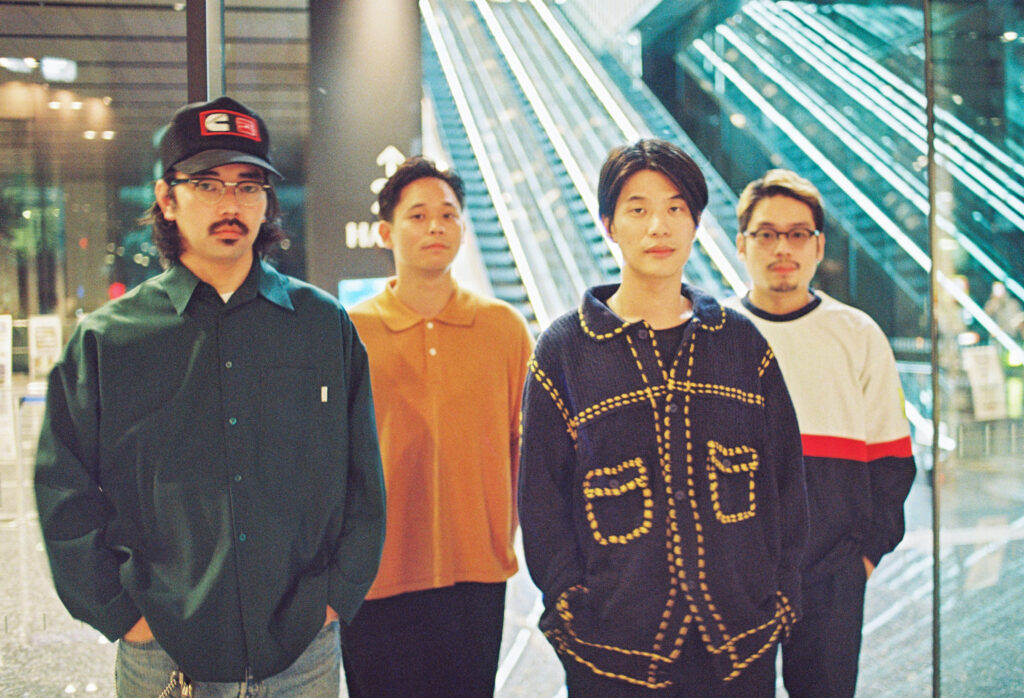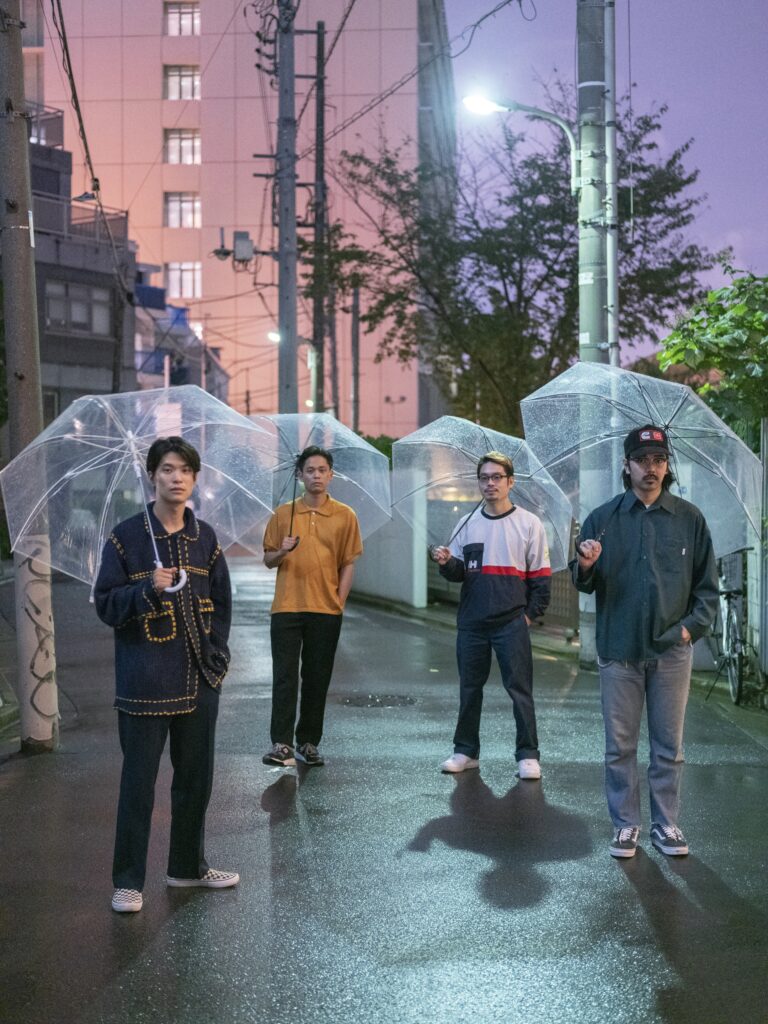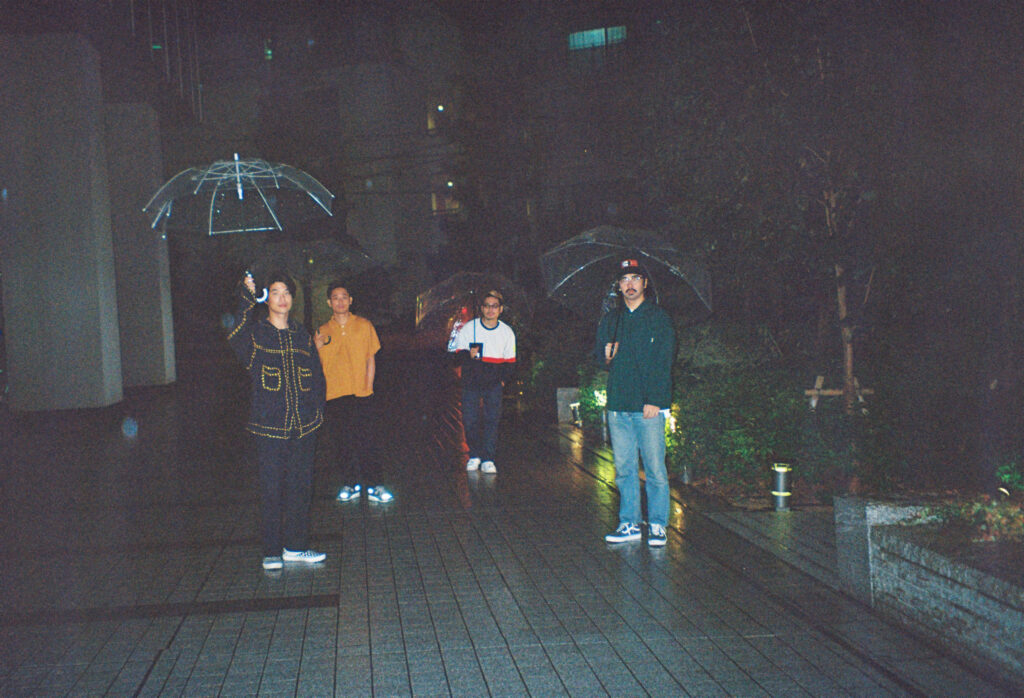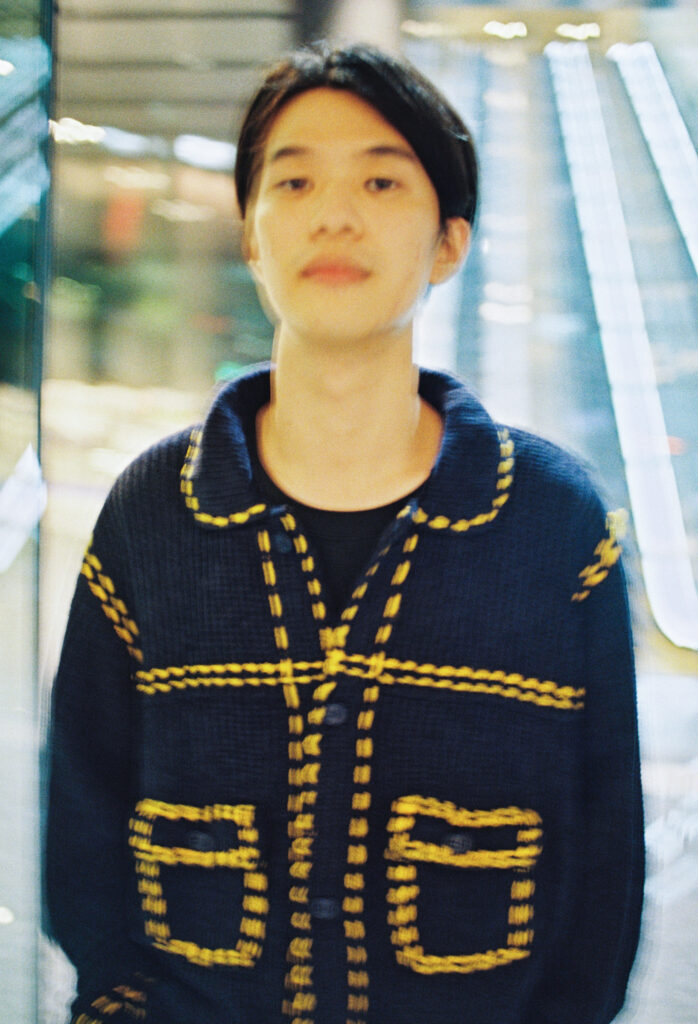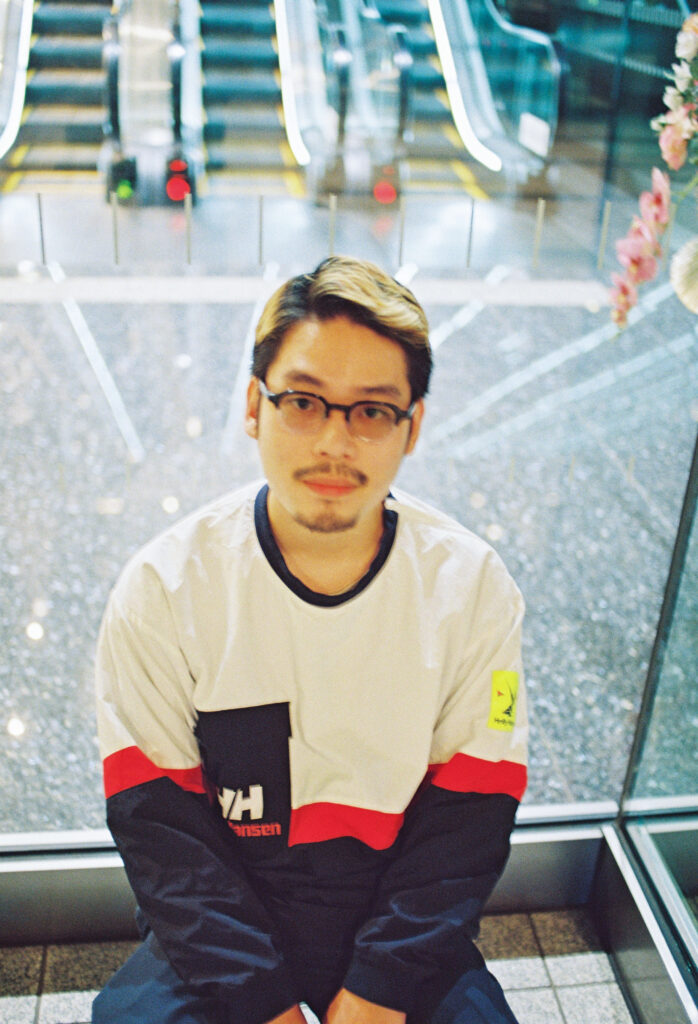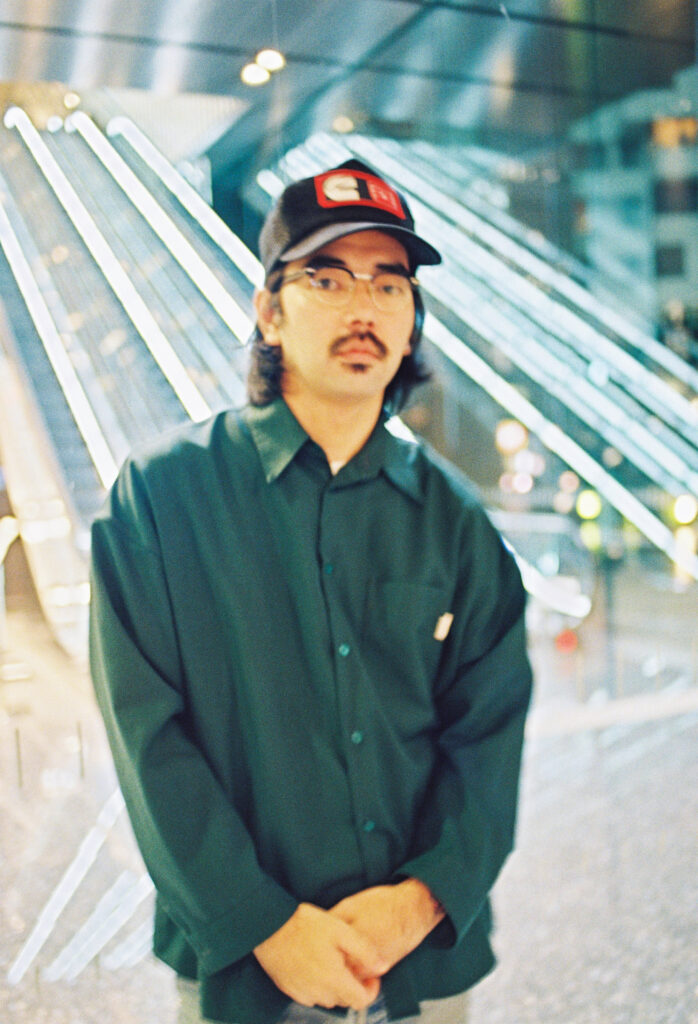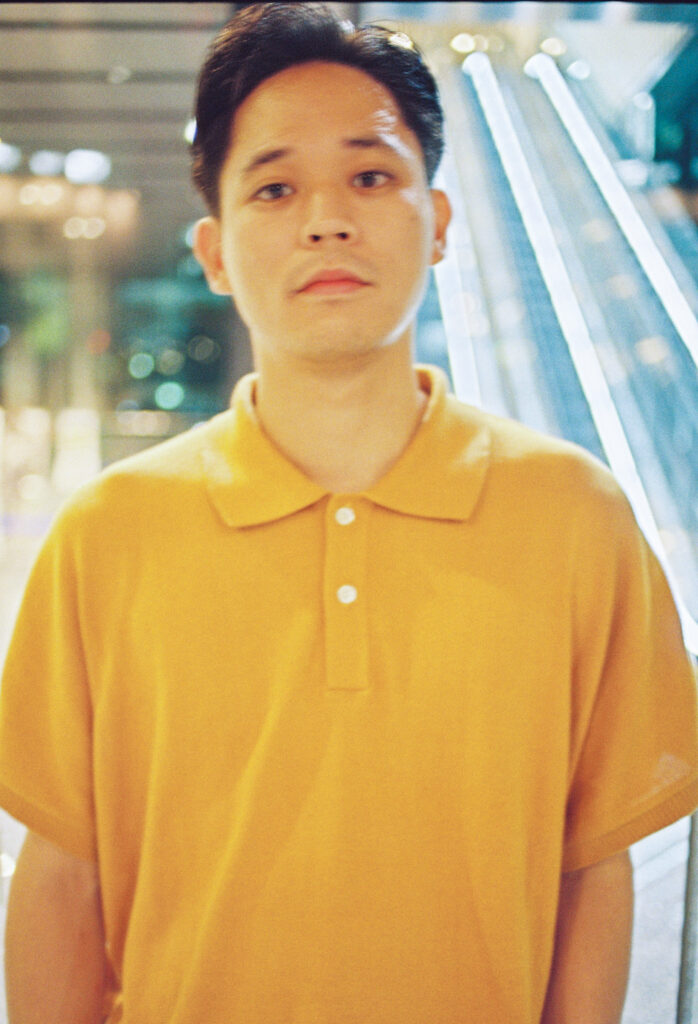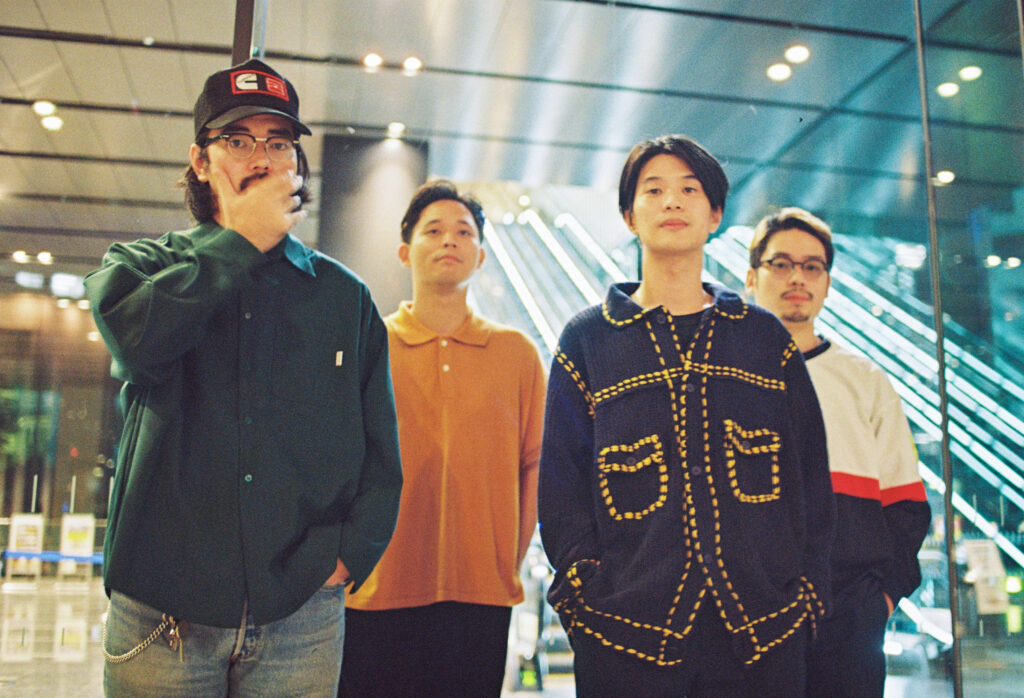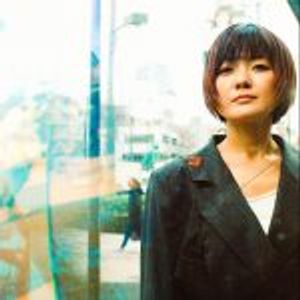This is a true documentary of a band surviving through the coronavirus pandemic.
From 2020 to 2021, a slew of concerts was inevitably canceled or postponed; if not, they had to be carried out under complex restrictions stemming from the prevention measures. Musicians play live shows not only for their delectation but also because it’s the centerpiece of their lives, and thus, the circumstances have not only affected them financially but also caused anguish and distress in them.
Today, in Tokyo, the quartet, Yogee New Waves, noodles 70s city-pop music that laments the Nihilism lurking in the urban city, complex human relationships, and city sceneries. The band was ready to release their 4th album in 2020 when Tokyo was supposed to be vibrant with the Olympics. However, much to their chagrin, the coronavirus cast a pall over the world and swept away their plans, chances to play shows, and their drive to live. In this interview, the band opens up about their emotions and times from when they had to grind to a halt, feeling like dried-up plants, to finally released their new album, WINDORGAN, coming out on October 13th.
——You are releasing your new album, WINDORGAN, after two and a half years since your previous record, BLUEHARLEM. Tell me how you spent the two and a half years, especially during the year and a half of the pandemic: What were your thoughts during the period? Did your stance toward life and music change? If so, is it reflected in your latest album?
Kengo Kakudate (from hereunder, Kakudate): Essentially, 60% of this record [WINDORGAN] was done before covid. Initially, we were planning to put it out at the same time as the Olympics, when the city was in a cheery mood, but things had to shut down because of the outbreak of Covid-19. Overseas artists were swiftly releasing their music, singing about the feelings they’ve experienced during the pandemic. But we had to keep to ourselves the songs we’d been sitting on for a long time, which was frustrating. We had continued working on our album at the beginning of the pandemic. But then, sooner or later, we unanimously agreed to take a break instead of moving forward in ambiguity. Then a year went by, and we started revving back the engine and discussed what we could do to get back working positively on the record. So things began moving forward from there, and eventually, we were able to release the album in October.
Tetsushi Kasuya (from hereunder, Kasuya): During the first state of emergency, we’d decided not to see one another, and like the rest of the world, we stayed home. We talked remotely, trying to figure out our plans for the future. Though, we weren’t sure when we’d be able to start playing shows again and thought releasing an album at that time would lead us nowhere. It was agonizing for us.
——How did you spend the blank year?
Kakudate: Well…I realized that playing live shows is the mainstay of my positive energy. I started playing on stage when I was three years old and kept going without ever stopping. But I had to stop for a year; on top of that, I was writing songs, but they didn’t sit right with me. I felt like I was spiraling down. So then, I relentlessly listened to ambient music and wrote some myself. I thought life wasn’t fun if I stopped making music, so I bought a flower and waited ’till it bloomed and inspired myself to write a song out of it. It was like self-imposed training. I wasn’t thinking about releasing the songs I was then making; I just wanted to be in my own shell while the world was quiet and far from the image of bands rambunctiously playing music. Also, during the time, I traced back my origins. I visited my old town where I used to live, went to see my percussionist mentor, and went on a journey to explore my roots. I used to play drums, so I started practicing drums again and recorded as I played. I drew pictures and did all the creative things I could possibly come up with. I also started practicing the keyboard. It’s just that no one was there to see me do all these things, which made me realize that I inherently like showcasing to people what I create. I’ve been showing people what I do and gauging my energy level based on their feedbacks. So, during the blank period, I was like a monk in training. I was about to lose my mind…or maybe, I was losing my mind.
——From interviewing many different artists, I really feel a lot of them are in the dumps from covid, as the stage, live shows, and their reasons to live have suddenly taken away from them.
Kakudate: But we don’t want people to feel bad as they see us. I think it’s natural for people who have been doing creative things to feel down in times like that. So, I took it as a healthy reaction. I instinctively knew that we were in a transition phase. It was like constantly twisting the cutoff knob on the synthesizer without a word…If you know what I mean [laughs].
——And at that time, you were into ambient music, right?
Kakudate: Ambient and also Jazz. Those two genres very much saved me.
——Why do you think you got into those two genres?
Kakudate: At first, they don’t seem to have any messages. It’s like they’re organically there in the environment. You don’t feel the artists’ messages or statements, and it feels like they’re made by nature. With music like Jazz, it’s like the artists are simply recording what they happen to have at the moment. That’s probably the reason why I was able to listen to those two genres.
Fascination towards relaxing sounds led to the creation of WINDORGAN
——I see. Which song in the album was written after the outbreak of covid?
Kakudate: The lyrics of “windorgan,” “JUST,” and “Toromi days” were written during the pandemic. I think it’s only these three songs.
Kasuya: Adding on to that, “SISSOU” was written before the pandemic but recorded recently.
——Ah, I see. It seems like “JUST” is the highlight song in the album. It feels like it’s capturing what’s “there.” It doesn’t feel like the writer’s aim or will is in the song, nor doesn’t even feel like it was made by the hand of a human. It feels like it was born naturally, as if you were guided by music or the world to create this song.
Kakudate: I went to a catholic school, so I’ve always had the idea of conveying the beauty of going to Mass. I feel in sync with my hometown, so it makes me feel dull if the town lacks energy. So, when covid started, I instantaneously felt down. And during the entire time, I was trying to figure out how to write songs again, and “JUST” was a song I wrote thinking that I should cut out the moments in time and turn them into a song. So, the title “JUST” comes from “Just in the moment.” I just went with what I was feeling “at the moment.” I jotted down my emotions and made the song out of it. I had the chills the entire time I was writing it.
——Was “JUST” written on a piano?
Kakudate: “Toromi days” was written on a piano, and “JUST” was first written on a gut-string guitar, then later played on an electronic piano.
——You had never written a song made on a piano before, right?
Kakudate: I had just bought an electronic piano. Before, I could make ambient music but couldn’t write songs on the keys as I didn’t really know how to put my emotions into words and turn them into lyrics. However, since I wrote “JUST,” I gradually became capable of expressing my feelings through words.
——Why did you decide to buy the piano?
Kakudate: Well…Before covid, when I was exhausted from doing promos, I found myself in a music store, and the next thing I knew, I was like, “This one…please” [laughs]. And that’s how I got the piano. It’s a very nice Wurlitzer piano, and ultimately, it was a healing instrument.
——Would you say the title, WINDORGAN, comes from that narrative and your attraction towards the relaxing sound of an organ?
Kakudate: Absolutely. I’ve always been interested in synths but never thought I’d be into instruments like the piano. I’ve always played the guitar; whenever I wrote songs, I simply decided whether I wanted a major or a minor chord. However, with the piano, I can play complex chords. I learned that for the man (=a note,) the other man (=other note) is a drag, but together they can create a profound harmony. I’ve established a deeper understanding of the chords.
——I feel like the same analogy applies to human relationships.
Kakudate: With this band, I see ourselves as a chord in harmony—We resonate well with one another.
——Is “WINDORGAN” an actual word?
Kakudate: In fact, it is. It’s an architecture-slash-instrument in the Netherlands. It’s often built by the beach and plays a sound as the wind blows. When we found out about it, we thought it’s somewhat related to us. It’s scattered around cities and driven by the wind to create sound. I think humans are like that as well.
——Kengo, I heard you did the arrangement and mixing of the instrumental track, “windorgan,” which comes in the middle of the album. Did you write the song when you were listening to ambient music and in the mood for it?
Kakudate: That’s exactly right. There are songs I’ve written in the past that start off with an abstract soundscape, like “CAN YOU FEEL IT” and “SUNSET TOWN,” but for this song [“windorgan”], I wanted to make it more contemporary.
Performing live shows is vital for bands as much as water is vital for plants
——And the rest of the members—How did you spend the blank year?
Kasuya: I’ve done many things. Covid really got me, and there were times I felt rotten. During the times where I had to stay in, I really didn’t know what to do. I couldn’t play drums at home as it’s too noisy, nor couldn’t go to the studio to practice, so there were days I was practicing on practice pads all day long. But after going through those days, I realized the importance of focusing on myself “now” and honing what I’m interested in the most. Ultimately, it’s essential to pursue what you like or what you are interested in.
——Kasuya, other than music and drums, what were the things you got into?
Kasuya: I got into fishing, curry, playing video games, drawing pictures, and percussions. Forcing myself to practice music when I really wanted to go fishing didn’t make my drumming any better, if not made it worse. I didn’t want to spiral down further into depression, so I focused on the things I enjoyed doing at the moment. So, I did fishing as much as I wanted to until my interest shifted to music…I’m repeating the same cycle even to this day. I’ve developed those ways of thinking during the year in a half.
——And Ueno, how was the year like for you?
Kosei Ueno (from hereunder, Ueno): I went through a lot of thoughts in my head, though the biggest change in me was…well, I’ve always liked listening to music since I was in elementary school, and music has always been central to my interest. I’ve been buying and listening to records even after starting a band, but I had completely lost interest in music during the pandemic. I stopped buying records and listening to new music. I felt like I was sacrificing myself from facing music. So, I started drawing pictures, and although I had never been interested in it, I’ve been enjoying it a lot, and it makes me feel like I’m rediscovering the lost pieces of myself. The world hasn’t recovered completely yet, and there’s still a lot to think… Though, I’m getting a lot of positive energy these days from playing at Fuji Rock festival, playing and recording for my friend’s song, and checking out my fashion designer friend’s clothing exhibition. I feel revitalized. But from now on, I’m ready to enjoy our tour and have fun with it.
——And you Bon-chan (Takemura)?
I don’t remember much…but I wrote music, watered my plants, cooked, listened to music or not, felt depressed. There were so many news that made me feel down. It might sound presumptuous, but I think everyone was feeling the same way as I did. Everything that came into our sight was full of negativity. I thought to myself, “What I’m feeling right now is temporary, so I should document them as a demo,” so I went to my PC and played the guitar or bass. I didn’t have any plans but thought I should note down the intangible things that described those moments, like thoughts, smell, temperature, wind, and anything other than emotions, so I can look back at them later and remind myself what it is was like. I’ve never been so dizzy from doing many different things, and at times I was really selfish, and at times I was considerate of others…At last, I don’t remember much about the past year and a half [laughs]. It was like walking an “unpaved gravel road.”
Like the way Kasuya got into curry and fishing, I was into growing plants. When I was upset, I would go to my plants and dedicate my love to them. They respond to your love, so now, my house is like a jungle. By the way, recently, a thought crossed my mind when I was thinking about our live shows.
——And what was that?
Takemura: I thought live shows for bands are vital as much as water is vital for plants. Playing live shows is imperative for bands like the way plants need water to grow and bear fruit.
——Last year, you couldn’t play any shows with live audience, and this year, you’ve so far played only three shows including the [Fuji Rock] festival.
Takemura: But did you know that lemon is sweeter when you don’t give them enough water? I think we’re like that, too.
Kakudate: Absolutely.
Musicians encourage and give hope to people
——[Laughs]. So, that means we can relish the sweet fruit from your new album and the upcoming tour. The album’s release was postponed for a year, but what made the band rev back up again?
Kakudate: We started working back again with “JUST.” We ignored the original arrangements of the song and decided to jam freely and record it. So, I think we started picking back up again from there. I don’t think the band did anything until then, and as far as I remember, “JUST” was the first song we worked on together in a while. Do you guys agree?
Kasuya: I think you’re right in the sense that the band started revving the engine back up again from that song. We each went through a lot, and as a band, we’ve collectively experienced the restrictive situation and felt as if we were at a dead-end, and we did a lot of talking. But during the difficult time, I think we managed to take a step forward this year as we started working on the song, “JUST.”
Kakudate: I think “JUST” is very much a band song, and the sound of each player stands out. Among other songs, I feel like this song captures each member’s “WINDORGAN moments.”
Kasuya: I like how the song is quiet, or I should say tranquil. And I think that’s what makes this song utterly distinctive from the other ones. It’s not merely about the complex layers of sounds, but you can hear the ways the players breathe and the way Kengo breathes out the words. I thought it turned out to be the kind of song we’ve never written before—that’s the impression I had when I first heard the final version.
——Because the release was delayed, were there songs that you inevitably cut from the album?
Kakudate: As far as I know, I think there were four or five songs [that were cut].
Kasuya: Since it’s been a while, some aspects of the songs were no longer “a fit to the current circumstances or sentiments.”
Kakudate: Pre-covid and now are in a continuous ground, but the feelings have changed. Back to our conversation earlier, I kept saying, “Let’s start over again” when making the album. I was like, “Why not write songs again?” But now, I’m confident to put out this album, although some sentiments still need to be updated. But I absolutely believe in the power of this album.
——In this album, we can hear and perceive Yogee’s distinctive and consistent sounds, signature sound layers, unique wordings, and portrayal of the humans and city’s energy that cannot be conveyed in words. It also shows how you’ve burnished your artistic power, and it’s full of great music. As a writer, when I see bands that finish a record that emanates positive energy after going through hard times, I tend to write something like, “The band is in a very positive mood right now, after overcoming the adversities”…But I don’t think that’s the case for you guys.
Kakudate: Well, it’s reality. I believe bands should stay real. I think people are way more encouraged by things that are true and not deliberately designed. Especially nowadays.
Kasuya: We just don’t want to lie. We want to tell people honestly that it took time to put out the new album as we went through a lot. I think it’s not worth making music if our feelings aren’t perceived properly.
Kakudate: From our stance as a band, we’re still in the pandemic. But that’s the same for many other people. What’s important for us is to be in the same circumstances as the listeners.
——You’re right, covid isn’t completely over yet.
Kakudate: Right, I sometimes just want to turn away from that fact. But I wrote the song to save people whenever they feel that way. So, I hope they listen to it.
Kasuya: We’re thinking positively about our upcoming tour. We haven’t been on the road for a while.
Kakudate: We’re so hyped up! It definitely goes by our lemon theory.
Takemura: It’s sure lemon. Absolutely.
Kakudate: I believe WINDORGAN is essential for times like this. Us musicians can encourage a lot of people. I genuinely feel blessed living a miraculous life as a musician. I want to keep that in mind as I tour.
Kasuya: I want to be more giving, and that feeling has gotten stronger than ever. It’s because we know that if we give more, we get more in return. We gain energy from playing live shows. And if the tour starts, we get to play shows every weekend… I’m so psyched just by thinking about it, and I’m about to go crazy [laughs].
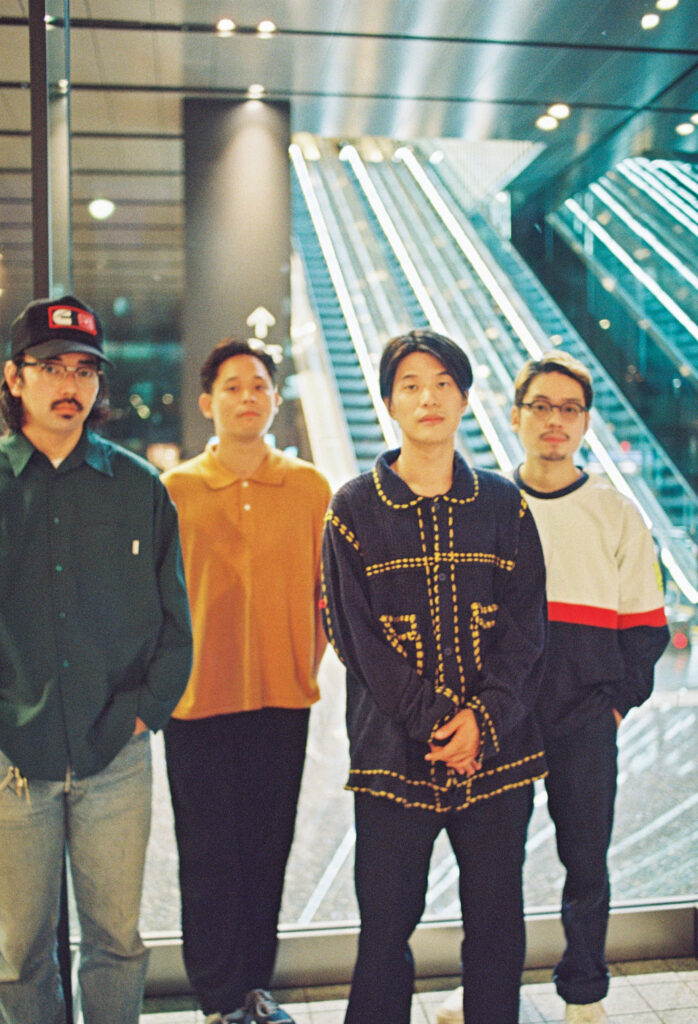
Yogee New Waves
The band was founded in 2013, comprised of four members: Kengo Kakudate (lead singer, guitar), Tetsushi Kasuya (drums), Fumiya Takemura (guitar), Kosei Ueno (bass). They debuted in April 2014 with CLIMAX NIGHT e.p. In September of the same year, they released their first album, PARAISO. In March 2019, they released their 3rd album, BLUEHARLEM. On July 12th, 2020, they released their new single, “White Lily Light,” on digital platforms and concurrently streamed their first-ever online live show, “Naked.” In December, they carried out a solo live show, Oneman Live “Escort,“ with a live audience at Zepp Tokyo and streamed online. In 2021, they performed at music festivals, including FUJI ROCK FESTIVAL ’21, for the first time in four years. And finally, their new album in approximately two and a half years, WINDORGAN, was released on October 13th this year. Furthermore, from October 16th, they will be starting their Japan tour, WINDORGAN TOUR 2021, performing in 14 different cities.
http://yogeenewwaves.tokyo
Twitter:@Yogees_band
Instagram:@yogeenewwaves
YouTube:https://www.youtube.com/channel/UCK8yCL7OaVb2PLg2XUh7Xyg
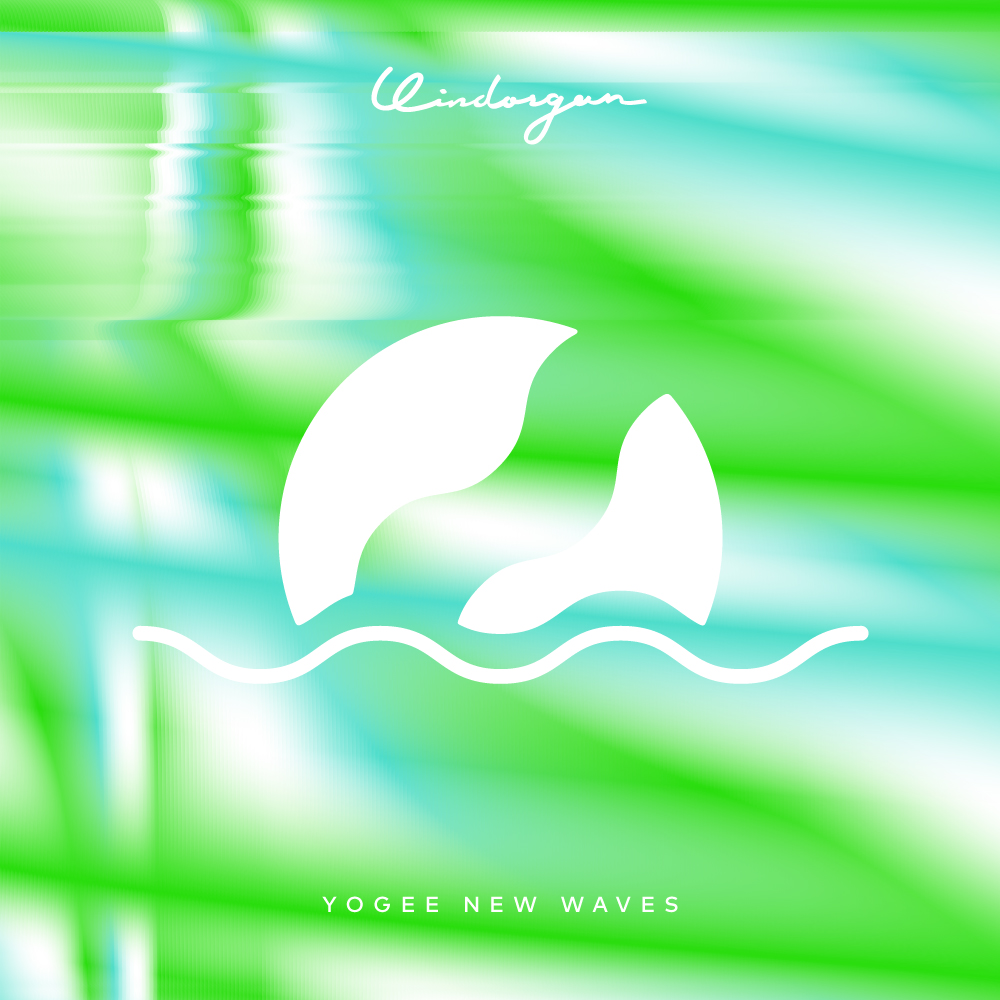
■Yogee New Waves 4th Album WINDORGAN
Release date: October 13th
Price: Original Version 3,300 yen, Analogue Version 4,400 yen, VOS Exclusive Version (CD + DVD + GOODS) 9,350 yen
Track Titles: 01. SISSOU/02. to the moon /03. You Make Me Smile Again /04. Night Sliders/05. JUST /06. Ana no Mujina /07. Ashita Tenki in Nare/08. windorgan /09. Toromi days feat.Kuo (落日飛車Sunset Rollercoaster) /10. Jungrete/11. Long Dream/12. White Lily Light
■WINDORGAN TOUR 2021
October 16th Fukuoka @DRUM LOGOS OPEN 16:30/START 17:30
October 17th Hiroshima @Club Quattro OPEN 16:45/START 17:30
October 23rd Takamatsu @DIME OPEN 16:45/START 17:30
October 24th Kyoto @TakuTaku OPEN 16:45/START 17:30
October 27th Sapporo @Penny Lane 24 OPEN 18:00/START 18:30
October 30th Kanazawa @EIGHT HALL OPEN 16:30/START 17:30
October 31st Niigata @GOLDEN PIGS RED OPEN 16:45/START 17:30
November 3rd Sendai @darwin’ OPEN 16:30/START 17:30
November 6th Okayama @YEBISU YA PRO OPEN 16:45/START 17:30
November 7th Hamamatsu @MadowakuOPEN 16:30/START 17:30
November 12th Shinsaibashi @BIGCAT OPEN 17:00/START 18:00
November 13th Nagoya @BOTTOM LINE OPEN/START 16:30/17:30
November 16th Tokyo @Zepp Tokyo OPEN 17:00/START 18:00
December 4th Okinawa @Output OPEN 17:00/START 18:00
http://yogeenewwaves.tokyo/live
Photography Takuroh Toyama

